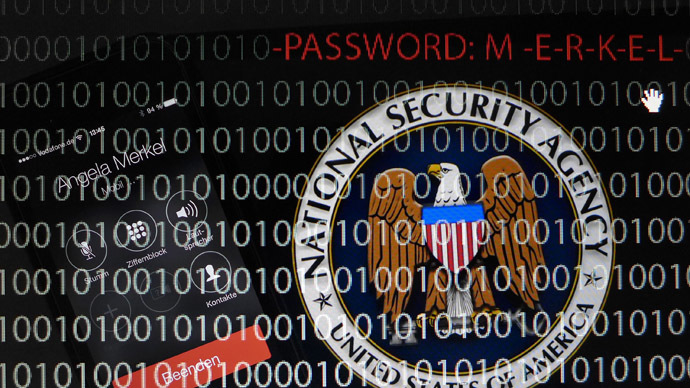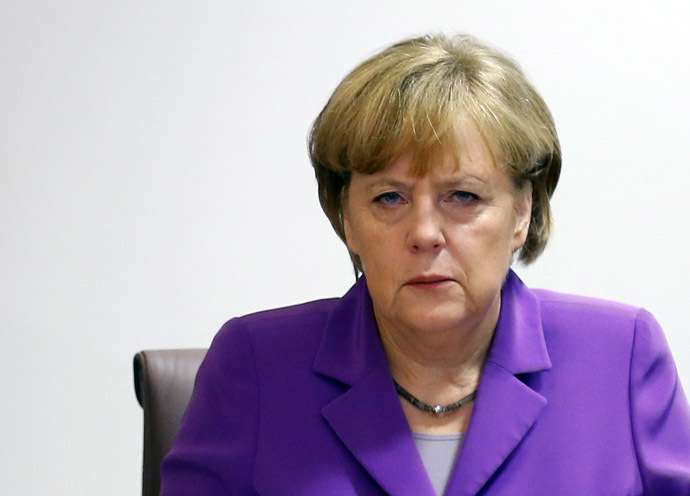‘Take what the NSA says with a shaker of salt’

US spying on Berlin is due to concerns over the European Central Bank’s closer ties with the Chinese Central Bank, and anything the NSA says should be taken “with a shaker of salt,” Gerald Horne, a historian at the University of Houston, told RT.
The US fears that the rapprochement of the two banks may lead to sidelining of the Federal Reserve in Washington.
However, the National Security Agency has insisted that President Barack Obama did not know about the spying on world leaders’ private communications.
An NSA spokeswoman released a statement Sunday after Bild am Sonntag reported that Obama did in fact know about and approve the surveillance.
‘[General] Alexander did not discuss with President Obama in 2010 an alleged foreign intelligence operation involving German Chancellor Merkel," she said, adding that "news reports claiming otherwise are not true."
Gerald Horne says that surveillance between states is a fact of life, however, whatever politicians may say to the contrary.
RT:Washington denies that President Obama had prior knowledge of the wiretapping. Who is telling the truth here, do you think?
Gerald Horne: I’m afraid that Mr. Obama is in a position where he has to deny what is painfully obvious. You should recognize that one of the many reasons why the United States spies on Chancellor Angela Merkel is economic espionage. That’s to say that US corporations like Ford are in competition with Volkswagen or software manufacturers in competition with SAP for example, and Siemens of Germany is in competition with GE. By bugging telephones at a high level in Berlin the United States can get information that can be very helpful to the competitors of these German corporations.
RT:Ties between EU and the US are vital – how much damage will the surveillance scandal really do to them?
GH: It can cause enormous damage. I do believe that Chancellor Merkel was probably somewhat aware of the spying and surveillance of her cellphone, but the problem is that the German populace was unaware and there is a tidal wave of revulsion at this intervention in Germany’s affairs. Therefore Chancellor Merkel has to respond and that complicates Berlin-Washington relations.

RT:European countries are also doing their own spying, not to mention collaborating with the NSA – why is the US getting all the flak?
GH: Because the United States is the heavyweight champion of surveillance. The United States not only engages in surveillance against alleged foes like Al-Qaeda, for example, like the Cubans, the North Koreans, or the Iranians, but also against allies such as the French, the Germans etc. And because of this proclivity in Washington, it’s understandable why the United States gets the attention when it comes to surveillance.
RT:Apart from angry words and protest marches, have the Snowden leaks done any good? Will there be any real change in surveillance policy?
GH: My understanding is that Washington is engaged in an agonizing reappraisal of its surveillance methods against friendly nations such as Germany and France. It would not surprise me at all if Washington moved toward a relationship with Germany and France [like] that it now has with Britain, for example, or Australia, New Zealand or Canada, where their much closer relations and at least on the official level there is no surveillance of cell phones of the leaders of those latter nations.
RT:The NSA memos say eavesdropping on world leaders produced little valuable intelligence. What's the point of risking diplomatic fallout for something that's not of any use to anyone?
GH: Well, I would take what the NSA says with a grain of salt, in fact with a shaker of salt. You have to realize also that one of many reasons why Washington spies on Berlin is because of hysteria about the role of the Green Party in Germany, about the role of the Left Party in Germany, and there is also concern about the European Central Bank and its ever-closer relationships with the Chinese Central Bank and how that may lead to sidelining of the Federal Reserve in Washington. All of these reasons shed light upon this massive surveillance program against supposedly friendly nations.
The statements, views and opinions expressed in this column are solely those of the author and do not necessarily represent those of RT.
The statements, views and opinions expressed in this column are solely those of the author and do not necessarily represent those of RT.












